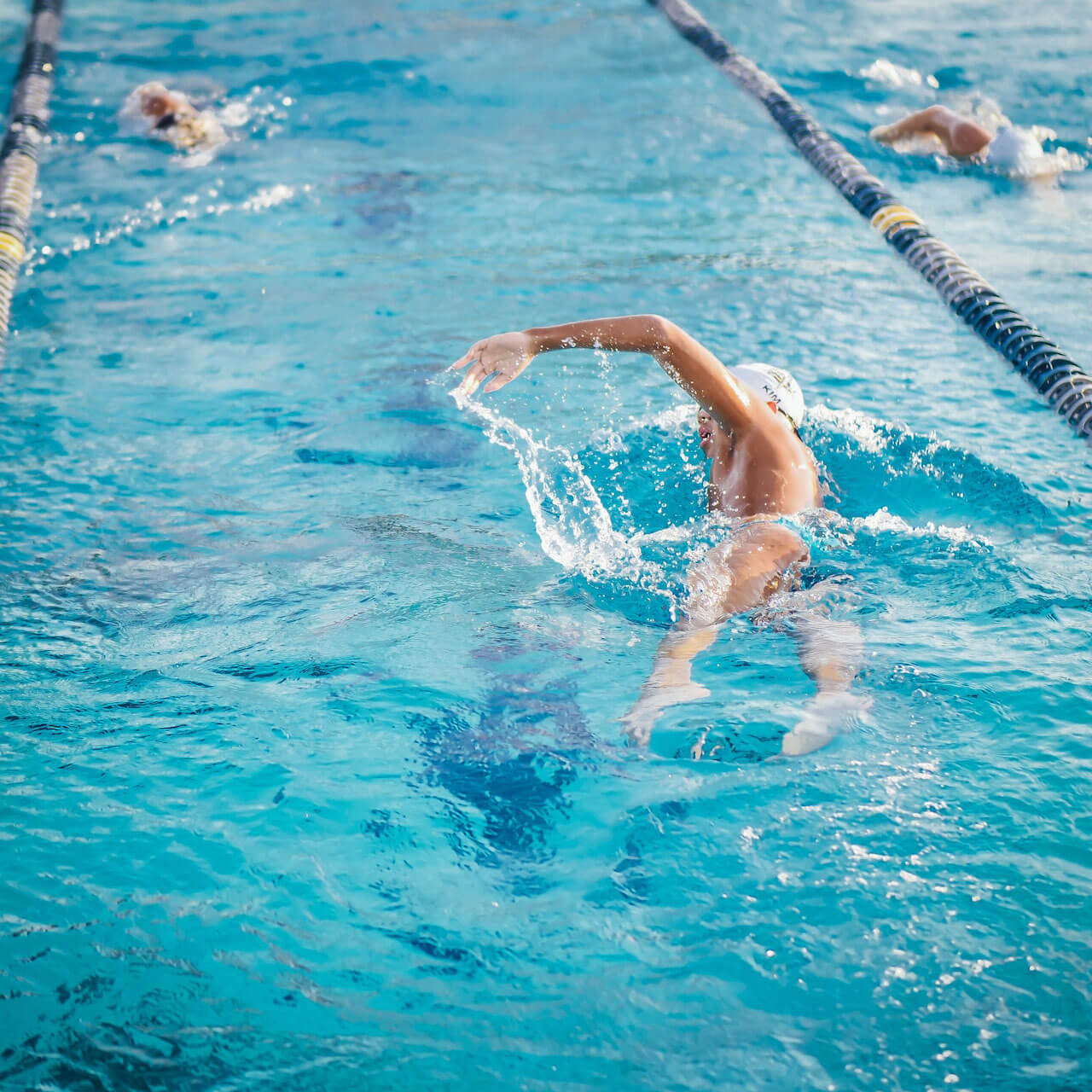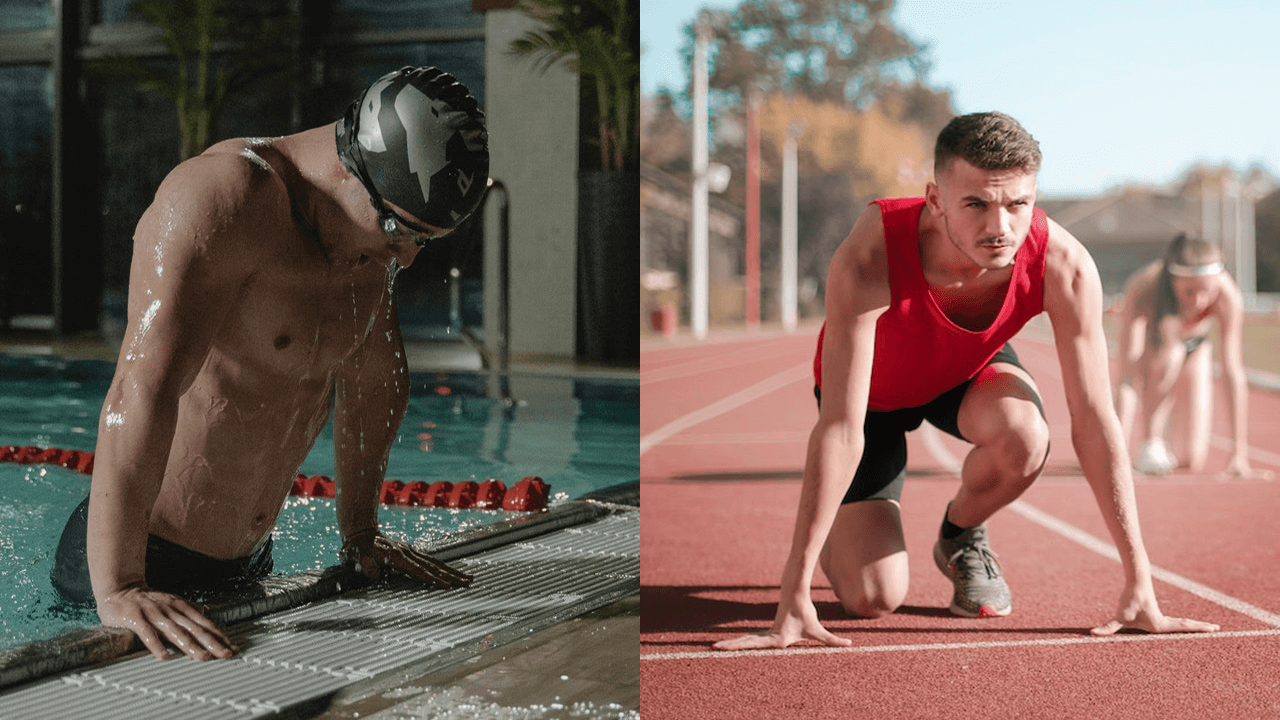Have you ever watched a swimmer glide through the water with a grace and power that leaves you in awe, and found yourself wondering if those same athletes could transfer their skills to land, specifically to running? Are swimmers good runners as well?

Being a good swimmer doesn’t inherently make one a good runner. The skills and physical attributes that make a person excel in swimming don’t directly translate into running expertise. However, the holistic fitness, mental toughness, and improved cardiovascular health that come with regular swimming can certainly provide an advantage for swimmers venturing into running, especially when compared to untrained individuals.
In this article, we’ll discuss just how transferable one’s skills from the domain of swimming to running, and some other burning questions many have about transitioning from one sport to the other.
Ways Swimming Benefits Running

Swimming can indeed improve your running performance, but mostly indirectly. It’s not that you’ll be doing the butterfly stroke down the track, but the skills and training involved in swimming can be quite transferable or beneficial to running.
- Strengthens the cardiovascular system: Both running and swimming are aerobic exercises that increase your heart rate and improve your overall cardio fitness. By swimming, you can help condition your cardiovascular system, increase your lung capacity, and thus improve your endurance for running.
- Builds core and upper body strength: Running primarily uses the lower body, but having a strong core and upper body can enhance your running efficiency. Swimming is fantastic for this as it works your entire body, helping to build strength in areas that running doesn’t typically target.
- Promotes recovery and injury prevention: Swimming is a low-impact sport, which means it’s a great way to recover on your non-running days while still getting in a solid workout. The low-impact nature of swimming can also help prevent injuries that are common in high-impact sports like running.
- Improves lung capacity and breath control: The breath control required in swimming, especially in techniques like bilateral breathing in freestyle swimming, can significantly improve your lung capacity and your ability to control your breathing. This, in turn, can benefit your running by teaching you to breathe more efficiently, which is crucial for long-distance running.
- Enhances mental toughness: Swimming laps can be a solitary and meditative experience, requiring mental toughness to maintain focus. This can translate to running, where mental endurance is often just as important as physical endurance.
Frequently Asked Questions

How does the transition from swimming to running affect your body, especially the quads, lower back, and calves?
Transitioning from swimming to running can initially be tough on the lower body, including the quads, lower back, and calves. This is due to the different physical demands of the two activities. Running involves high-impact, weight-bearing exercise, while swimming is low-impact and non-weight-bearing. As a result, muscles that aren’t as heavily used in swimming may initially feel strained when you start running. However, this discomfort typically subsides as the body adapts to the new form of exercise.
Can swimmers become good marathon runners with consistent training? What changes in focus and technique are required?
Yes, swimmers can become proficient marathon runners with consistent training. However, they must shift their focus from swimming to running, incorporating regular running workouts into their routine, while still maintaining some swimming for cross-training purposes. Technique adjustments will also be needed, as running form is quite different from swimming form. For instance, learning to maintain proper posture, stride mechanics, and pacing will be important for marathon running.
How does the high flexibility required in swimming, especially in the ankles, affect running? Can it lead to injuries?
The high ankle flexibility advantageous in swimming can potentially increase the risk of ankle injuries in running, such as sprains. Therefore, runners with highly flexible ankles need to be mindful of this risk and may benefit from exercises that strengthen the ankle and improve balance, such as single-leg stands or calf raises.
Can someone who is not good at running benefit from starting to swim?
Absolutely! Swimming is a fantastic low-impact exercise that can help improve cardiovascular fitness, overall strength, and endurance. If running is challenging due to factors like joint pain or lack of fitness, swimming can be a great alternative to start building fitness. Once they’ve built up a base level of fitness, they might find running becomes easier too.
How does the physical demand of sprint running versus long distance running compare to swimming? Can the training for one be detrimental to the other?
Sprint running and sprint swimming both demand quick bursts of speed and rely on fast-twitch muscle fibers, whereas long-distance running and longer swimming events require endurance and rely more on slow-twitch muscle fibers. Training for long-distance running could potentially impact swimming performance, especially in sprint events, due to the different muscle fiber types and energy systems used. Therefore, athletes would need to carefully balance their training regimen depending on their specific goals in each sport.
What’s the best way to train for running while maintaining a regular swimming routine?
The best way to train for running while maintaining a swimming routine is to integrate both activities into your weekly training schedule in a balanced manner. For example, you might alternate between running and swimming workouts, or use swimming sessions as active recovery on days after hard running workouts. Always listen to your body and adjust your training load based on how you’re feeling to prevent overtraining.
The Takeaway
While it’s true that swimmers may not be naturally gifted runners, the holistic fitness and resilience they develop in the pool can serve as a strong foundation for running.
For instance, swimming builds cardiovascular fitness, promotes muscular endurance, and cultivates the mental fortitude needed for long-distance running. Yet, it’s crucial to remember that these benefits are indirect; they provide a solid base but won’t necessarily make you a marathoner overnight.
Ultimately, becoming a better runner—whether you’re a swimmer or not—comes down to dedicated and consistent running-specific training.
This includes gradually increasing your running mileage, incorporating speed and hill workouts, and learning the proper running form and technique. The transferable benefits from swimming can give you a leg up when starting your running journey, but to truly excel in running, there’s no substitute for lacing up your shoes and hitting the pavement (or trail).
So, take what you’ve gained from the pool, apply it to the track, and above all, enjoy the journey of becoming a stronger, faster, and more efficient runner. Remember, every step you take is a step in the right direction.
Sources:

